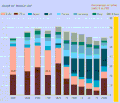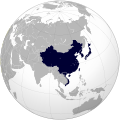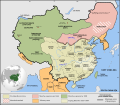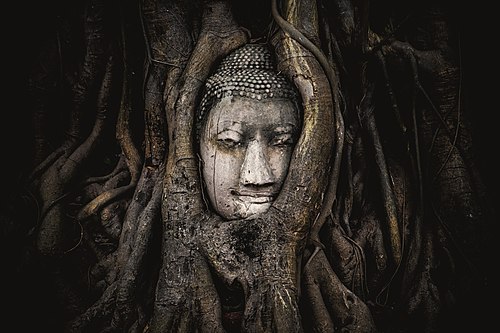
Back بوابة:آسيا Arabic ܬܪܥܐ:ܐܣܝܐ ARC Portal:Asiya Azerbaijani Партал:Азія BE-X-OLD প্রবেশদ্বার:এশিয়া Bengali/Bangla دەروازە:ئاسیا CKB Portal:Asien German Portal:Asya DIQ Πύλη:Ασία Greek Portal:Asia Spanish

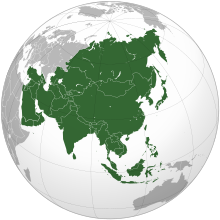 Asia (/ˈeɪʒə/ AY-zhə, UK also /ˈeɪʃə/ AY-shə) is the largest continent in the world by both land area and population. It covers an area of more than 44 million square kilometers, about 30% of Earth's total land area and 8% of Earth's total surface area. The continent, which has long been home to the majority of the human population, was the site of many of the first civilizations. Its 4.7 billion people constitute roughly 60% of the world's population. Asia shares the landmass of Eurasia with Europe, and of Afro-Eurasia with both Europe and Africa. In general terms, it is bounded on the east by the Pacific Ocean, on the south by the Indian Ocean, and on the north by the Arctic Ocean. The border of Asia with Europe is a historical and cultural construct, as there is no clear physical and geographical separation between them. It is somewhat arbitrary and has moved since its first conception in classical antiquity. The division of Eurasia into two continents reflects East–West cultural, linguistic, and ethnic differences, some of which vary on a spectrum rather than with a sharp dividing line. A commonly accepted division places Asia to the east of the Suez Canal separating it from Africa; and to the east of the Turkish Straits, the Ural Mountains and Ural River, and to the south of the Caucasus Mountains and the Caspian and Black seas, separating it from Europe. China and India traded places as the largest economies in the world from 1 to 1800 CE. China was a major economic power for much of recorded history, with the highest GDP per capita until 1500. The Silk Road became the main east–west trading route in the Asian hinterlands while the Straits of Malacca stood as a major sea route. Asia has exhibited economic dynamism as well as robust population growth during the 20th century, but overall population growth has since fallen. Asia was the birthplace of most of the world's mainstream religions including Hinduism, Zoroastrianism, Judaism, Jainism, Buddhism, Confucianism, Taoism, Christianity, Islam, Sikhism, as well as many other religions. (Full article...) Featured articleTamil (தமிழ், Tamiḻ, pronounced [t̪amiɻ] ) is a Dravidian language natively spoken by the Tamil people of South Asia. Tamil is an official language of the Indian state of Tamil Nadu and union territory of Puducherry, and the sovereign nations of Sri Lanka and Singapore. Tamil is also spoken by significant minorities in the four other South Indian states of Kerala, Karnataka, Andhra Pradesh and Telangana, and the Union Territory of the Andaman and Nicobar Islands. It is also spoken by the Tamil diaspora found in many countries, including Malaysia, Myanmar, South Africa, United Kingdom, United States, Canada, Australia, New Zealand, United Arab Emirates, Saudi Arabia, France, Germany, Italy, Indonesia, and Mauritius. Tamil is also natively spoken by the Sri Lankan Moors. One of 22 scheduled languages in the Constitution of India, Tamil was the first to be classified as a classical language of India. Tamil is one of the longest-surviving classical languages in the world. A. K. Ramanujan described it as "the only language of contemporary India which is recognizably continuous with a classical past". The variety and quality of classical Tamil literature has led to it being described as "one of the great classical traditions and literatures of the world". Recorded Tamil literature has been documented for over 2000 years. The earliest period of Tamil literature, Sangam literature, is dated from c. 300 BC until AD 300. It has the oldest extant literature among Dravidian languages. The earliest epigraphic records found on rock edicts and 'hero stones' date from around the 3rd century BC. About 60,000 of the approximately 100,000 inscriptions found by the Archaeological Survey of India in India are in Tamil Nadu. Of them, most are in Tamil, with only about 5 percent in other languages. Tamil language inscriptions written in Brahmi script have been discovered in Sri Lanka and on trade goods in Thailand and Egypt. The two earliest manuscripts from India, acknowledged and registered by the UNESCO Memory of the World register in 1997 and 2005, were written in Tamil. (Full article...)Selected Country Indonesia, officially the Republic of Indonesia, is a country in Southeast Asia and Oceania between the Indian and Pacific oceans. It consists of over 17,000 islands, including Sumatra, Java, Sulawesi, and parts of Borneo and New Guinea. Indonesia is the world's largest archipelagic state and the 14th-largest country by area, at 1,904,569 square kilometres (735,358 square miles). With over 280 million people, Indonesia is the world's fourth-most-populous country and the most populous Muslim-majority country. Java, the world's most populous island, is home to more than half of the country's population. Indonesia is a presidential republic with an elected legislature. It has 38 provinces, of which nine have special autonomous status. The country's capital, Jakarta, is the world's second-most-populous urban area. Indonesia shares land borders with Papua New Guinea, East Timor, and the eastern part of Malaysia, as well as maritime borders with Singapore, Vietnam, Thailand, the Philippines, Australia, Palau, and India. Despite its large population and densely populated regions, Indonesia has vast areas of wilderness that support one of the world's highest levels of biodiversity. (Full article...)Featured biographyAntiochus XI Epiphanes Philadelphus (Greek: Ἀντίοχος Ἐπιφανής Φιλάδελφος; died 93 BC) was a Seleucid monarch who reigned as King of Syria between 94 and 93 BC, during the Hellenistic period. He was the son of Antiochus VIII and his wife Tryphaena. Antiochus XI's early life was a time of constant civil war between his father and his uncle Antiochus IX. The conflict ended with the assassination of Antiochus VIII, followed by the establishment of Antiochus IX in Antioch, the capital of Syria. Antiochus VIII's eldest son Seleucus VI, in control of western Cilicia, marched against his uncle and had him killed, taking Antioch for himself, only to be expelled from it and driven to his death in 94 BC by Antiochus IX's son Antiochus X. Following the murder of Seleucus VI, Antiochus XI declared himself king jointly with his twin brother Philip I. Dubious ancient accounts, which may be contradicted by archaeological evidence, report that Antiochus XI's first act was to avenge his late brother by destroying Mopsuestia in Cilicia, the city responsible for the death of Seleucus VI. In 93 BC, Antiochus XI took Antioch, an event not mentioned by ancient historians but confirmed through numismatic evidence. Antiochus XI appears to have been the senior king, minting coinage as a sole king and reigning alone in the capital, while Philip I remained in Cilicia, but kept his royal title. Antiochus XI may have restored the temple of Apollo and Artemis in Daphne, but his reign did not last long. In the autumn of the same year, Antiochus X regrouped and counter-attacked; Antiochus XI was defeated and drowned in the Orontes River as he tried to flee. (Full article...)General imagesThe following are images from various Asia-related articles on Wikipedia. Featured pictureThe head of a sandstone Buddha statue nestled in the tree roots beside the minor chapels of Wat Maha That, Phra Nakhon Si, Ayutthaya Province, Thailand. The temple is one of the most tourist and photographic attractions in the UNESCO World Heritage Site of Ayutthaya, an ancient capital of Siam.
Did you know...
Updated: 6:33, 14 February 2024 In the news
Related portalsMajor Religions in Asia Middle East Central Asia and Surroundings Indian Subcontinent Southeast Asia East Asia Selected panorama
Baalbek is a town in the Beqaa Valley of Lebanon situated east of the Litani River. It is famous for its exquisitely detailed yet monumentally scaled temple ruins of the Roman period, when Baalbek, then known as Heliopolis, was one of the largest sanctuaries in the Empire. TopicsCategoriesAssociated WikimediaThe following Wikimedia Foundation sister projects provide more on this subject:
More portalsShortcuts to this page: Asia portal • P:ASIA Purge server cache |






